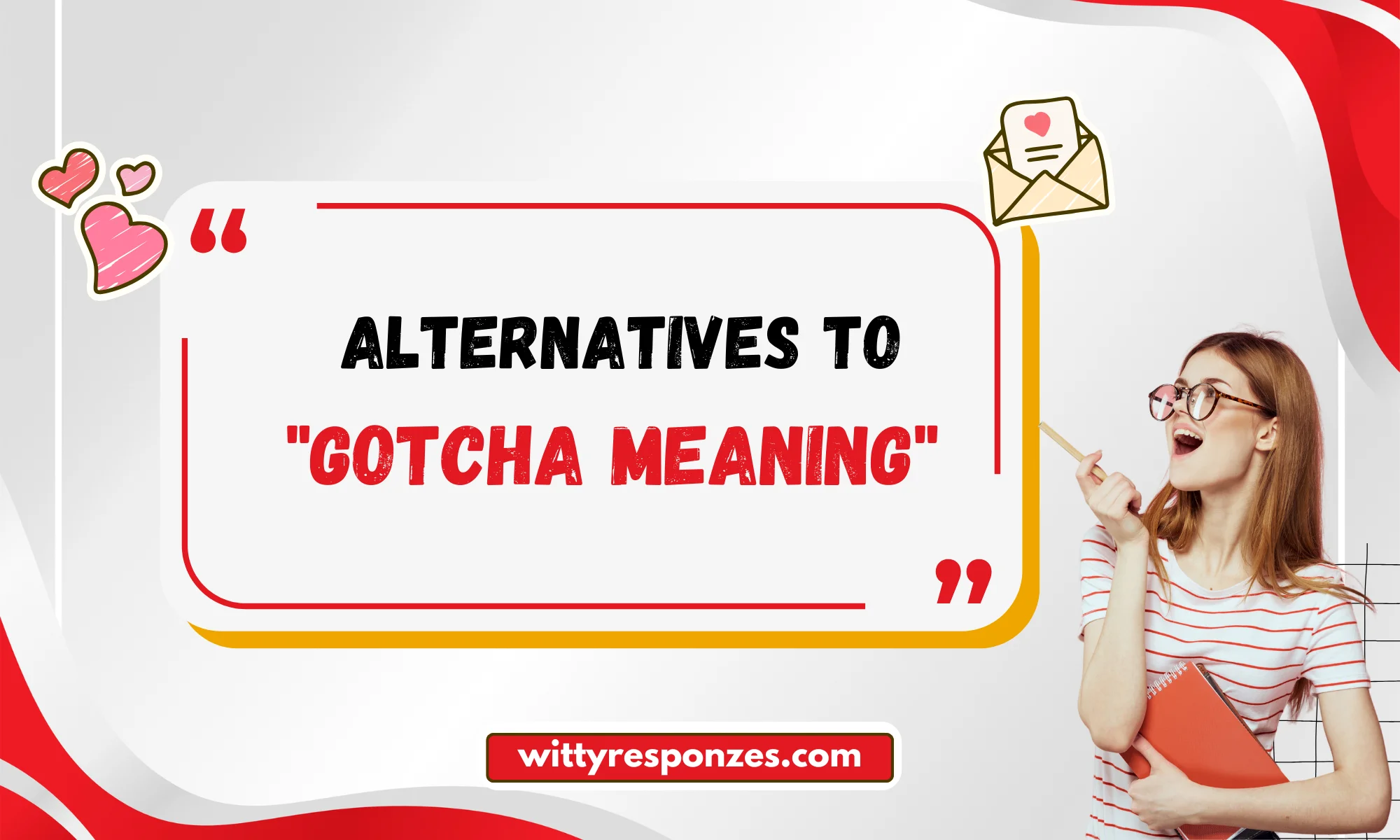“Gotcha” is a casual way of saying “I understand” or “I acknowledge what you said.” While it works in informal conversations, it might not always be the best choice in professional or formal settings. Sometimes, you might need a clearer, more polished alternative, depending on the tone and context.
In this article, we’ll explore various ways to replace “gotcha” with more suitable expressions. Whether you’re texting a friend, emailing a colleague, or responding to a client, you’ll find plenty of options to use. Plus, we’ll provide texting examples to help you see these alternatives in action.
What Does “Gotcha” Mean?
Before diving into alternatives, let’s understand what “gotcha” really means.
- Casual Understanding: When someone explains something, and you reply with “Gotcha!” it means you understand.
- Acknowledgment: You can use it to confirm that you’ve received information, like an address or instructions.
- Playful Usage: Sometimes, “Gotcha!” is used jokingly to mean “I caught you,” especially in pranks or jokes.
While “gotcha” is widely understood, it’s informal. Using it in emails, business meetings, or formal discussions might not always be appropriate. That’s why it’s helpful to have alternatives ready.
Alternatives to “Gotcha” and When to Use Them
Each of these alternatives is suited for different situations. Some are better for professional emails, while others work well in everyday conversations.
1. I Understand
Best for: Professional and serious discussions.
This is a direct and polite way to acknowledge information.
Example: “I understand your concerns and will address them accordingly.”
2. Noted
Best for: Emails and formal responses.
A short and professional way to confirm receipt of information.
Example: “Noted. I’ll make the necessary changes.”
3. Understood
Best for: Work-related communication and instructions.
A simple yet effective way to confirm comprehension.
Example: “Understood! I’ll see you at 3 PM.”
4. Got It
Best for: Professional yet slightly casual interactions.
A friendly yet professional way to acknowledge instructions.
Example: “Got it! I’ll submit the report by tomorrow.”
5. Makes Sense
Best for: Conversations where someone explains something.
Useful when agreeing with or acknowledging an explanation.
Example: “Makes sense! Thanks for explaining.”
6. I See
Best for: Processing and acknowledging new information.
Example: “I see what you mean about the budget constraints.”
7. Sounds Good
Best for: Casual conversations and friendly agreements.
Example: “Sounds good! Let’s move forward with the plan.”
8. Copy That
Best for: Quick confirmations, often in workplace settings.
Example: “Copy that. I’ll get started immediately.”
9. Acknowledged
Best for: Formal and structured communication.
Example: “Acknowledged. I’ll ensure this is completed as requested.”
10. Will Do
Best for: Informal yet professional work interactions.
Example: “Will do! Expect an update by end of day.”
11. Roger That
Best for: Playful or military-inspired confirmation.
Example: “Roger that! Meeting confirmed for Friday.”
12. Fair Enough
Best for: Accepting someone’s reasoning or opinion.
Example: “Fair enough, I see your point.”
13. Absolutely
Best for: Strong agreement with enthusiasm.
Example: “Absolutely! That plan makes perfect sense.”
14. Right On
Best for: Casual and enthusiastic responses.
Example: “Right on! Let’s make it happen.”
15. Duly Noted
Best for: Professional settings where formality is required.
Example: “Duly noted. I’ll incorporate the feedback accordingly.”
13 Texting Examples for Different Situations
Formal (Work/Emails)
- Noted. I’ll get back to you soon.
- Understood! I’ll make the adjustments.
- Acknowledged. Thank you for the update.
Casual (Friends/Family)
- Got it! Let’s meet at 6.
- Makes sense, thanks for clarifying.
- Fair enough! I didn’t think of it that way.
Playful/Fun
- Roger that, captain!
- Copy that, mission accepted.
- Right on! Excited for this!
Professional (Meetings/Client Conversations)
- Duly noted, I’ll review the details.
- Absolutely! I’ll have the report ready.
- Sounds good. Looking forward to our discussion.
- I see what you mean. Let’s proceed accordingly.
Conclusion
Choosing the right alternative to “gotcha” can make your communication more polished, clear, and professional. Whether you’re in a business meeting, texting a friend, or responding to an email, using a more appropriate phrase ensures that your message is received in the best possible way.
Try out different options and see which ones fit your style and the context you’re in. Having multiple alternatives will help you sound more natural, adaptable, and professional in various conversations.

𝐈’𝐦 Ella Rose 𝐭𝐡𝐞 𝐜𝐫𝐞𝐚𝐭𝐢𝐯𝐞 𝐦𝐢𝐧𝐝 𝐛𝐞𝐡𝐢𝐧𝐝 “𝐖𝐢𝐭𝐭𝐲 𝐑𝐞𝐬𝐩𝐨𝐧𝐬𝐞𝐬 ” 𝐰𝐡𝐞𝐫𝐞 𝐰𝐞 𝐭𝐮𝐫𝐧 𝐨𝐫𝐝𝐢𝐧𝐚𝐫𝐲 𝐫𝐞𝐩𝐥𝐢𝐞𝐬 𝐢𝐧𝐭𝐨 𝐞𝐱𝐭𝐫𝐚𝐨𝐫𝐝𝐢𝐧𝐚𝐫𝐲 𝐛𝐮𝐫𝐬𝐭𝐬 𝐨𝐟 𝐡𝐮𝐦𝐨𝐫. 𝐖𝐢𝐭𝐡 𝐚 𝐟𝐥𝐚𝐢𝐫 𝐟𝐨𝐫 𝐜𝐫𝐚𝐟𝐭𝐢𝐧𝐠 𝐬𝐡𝐚𝐫𝐩 𝐰𝐢𝐭𝐭𝐲 𝐜𝐨𝐦𝐞𝐛𝐚𝐜𝐤𝐬. 𝐈 𝐬𝐩𝐞𝐜𝐢𝐚𝐥𝐢𝐳𝐞 𝐢𝐧 𝐦𝐚𝐤𝐢𝐧𝐠 𝐲𝐨𝐮𝐫 𝐢𝐧𝐭𝐞𝐫𝐚𝐜𝐭𝐢𝐨𝐧𝐬 𝐮𝐧𝐟𝐨𝐫𝐠𝐞𝐭𝐭𝐚𝐛𝐥𝐞. 𝐀𝐭 “𝐖𝐢𝐭𝐭𝐲 𝐑𝐞𝐬𝐩𝐨𝐧𝐬𝐞𝐬” 𝐨𝐮𝐫 𝐦𝐢𝐬𝐬𝐢𝐨𝐧 𝐢𝐬 𝐭𝐨 𝐢𝐧𝐟𝐮𝐬𝐞 𝐲𝐨𝐮𝐫 𝐜𝐨𝐧𝐯𝐞𝐫𝐬𝐚𝐭𝐢𝐨𝐧𝐬 𝐰𝐢𝐭𝐡 𝐜𝐡𝐚𝐫𝐦 𝐚𝐧𝐝 𝐜𝐥𝐞𝐯𝐞𝐫𝐧𝐞𝐬𝐬. 𝐃𝐢𝐯𝐞 𝐢𝐧𝐭𝐨 𝐭𝐡𝐞 𝐟𝐮𝐧 𝐚𝐧𝐝 𝐥𝐞𝐭𝐬 𝐦𝐚𝐤𝐞 𝐞𝐯𝐞𝐫𝐲 𝐫𝐞𝐬𝐩𝐨𝐧𝐬𝐞 𝐚 𝐦𝐞𝐦𝐨𝐫𝐚𝐛𝐥𝐞 𝐨𝐧𝐞𝐣𝐨𝐢𝐧 𝐮𝐬 𝐚𝐭 𝐖𝐢𝐭𝐭𝐲 𝐑𝐞𝐬𝐩𝐨𝐧𝐬𝐞𝐬 𝐟𝐨𝐫 𝐚 𝐝𝐨𝐬𝐞 𝐨𝐟 𝐝𝐞𝐥𝐢𝐠𝐡𝐭𝐟𝐮𝐥 𝐡𝐮𝐦𝐨𝐫.
